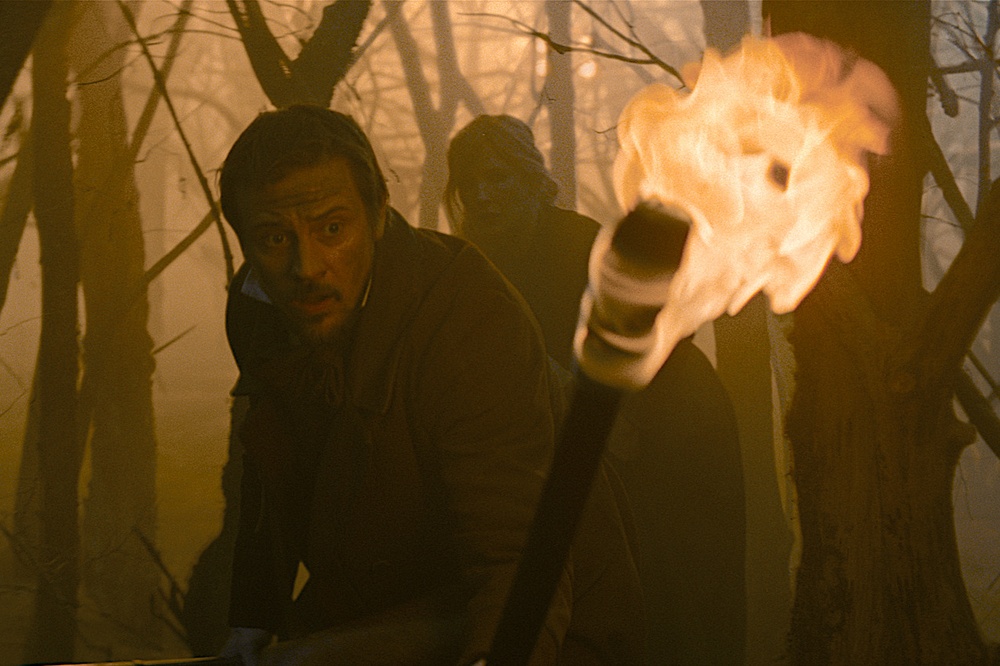Capsule reviews for Feb. 18

Boyd Holbrook stars in THE CURSED. (Photo: LD Entertainment)
A Banquet
Aside from its haunting imagery and creepy atmosphere, this moderately unsettling British psychodrama doesn’t provide much to chew on. It centers on troubled teenager Betsey (Jessica Alexander) who suddenly stops eating, causing her traumatized mother (Sienna Guillory) to suspect anorexia. However, Betsey isn’t losing weight, which suggests something more sinister has infected her, prompting a visit from Betsey’s grandmother (Lindsay Duncan) whose finger-pointing only widens the mother-daughter rift. Rookie director Ruth Paxton subverts genre cliches with a clever array of visual flourishes. Yet despite some audacious performances, the film’s female-centric examination of fractured family dynamics doesn’t yield many frights and is more muddled than provocative. (Not rated, 97 minutes).
The Cursed
Although its uninspired title suggests convention, this atmospheric period horror film provides some intriguing twists on werewolf mythology. It’s set primarily in the 19th century in a French village, where a mother (Kelly Reilly) and her family are apparently cursed after an act of brutal violence. When a pathologist (Boyd Holbrook) arrives to investigate, he must confront his own past to find the truth. The deliberately paced screenplay by director Sean Ellis (Anthropoid) never really gets under the skin, but it offers welcome thematic depth while avoiding jump scares. Even when the story stumbles in the final act, the sharply crafted visuals keep the carnage captivating. (Rated R, 113 minutes).
The Last Bus
Extolling the virtues of public transportation and reciprocal kindness toward seniors, this bittersweet British road-trip drama overcomes its earnest sentimentality thanks to Timothy Spall’s powerfully understated performance. Spall (Mr. Turner) plays a mild-mannered 90-year-old still grieving the death of his wife (Phyllis Logan) when he uses his free bus pass to journey from northern Scotland to southern England with a briefcase, the contents of which will bring closure. Mostly a series of vignettes spotlighting his encounters with eccentric strangers along the way, the film suffers from contrivances at various stops while trying to juggle tones both wistful and mournful. However, the heartfelt charm rolls along. (Not rated, 86 minutes).
The Ledge
Not a single character or moment rings true in this lurid rock-climbing saga that would be unintentionally humorous if it didn’t carelessly exploit violence against women for cheap thrills. Kelly (Brittany Ashworth) must fight for survival after her uninhibited friend is murdered by a rapist (Ben Lamb) they meet during a remote expedition. Suspended on a small mountain ledge with the psychopathic perpetrator lurking above her, Kelly’s resilience is tested while protecting video evidence of the crime. It’s a 15-minute idea inexplicably stretched to feature length, which drowns out any tension well before the final showdown. The amateurish performances hardly matter with a script this shallow. (Rated R, 86 minutes).
Pursuit
As generic as its title, this low-budget potboiler strings together assembly-line shootouts and confrontations between unscrupulous types with minimal subtlety or surprise. Rick (Emile Hirsch) is a high-level hacker trying to locate his wife, who apparently has been kidnapped by a drug cartel. As he infiltrates a high-level criminal enterprise, he runs afoul of a deputy (Jake Manley) and realizes the case might be connected to his estranged father (John Cusack). Hirsch’s twitchy loose-cannon performance supplies some welcome energy to this otherwise lackluster thriller that lacks character depth, instead relying on obvious twists and stale genre cliches as it funnels toward an inevitable final showdown. (Rated R, 96 minutes).
Strawberry Mansion
Despite some arresting imagery both amusing and unsettling, this oddball saga about dream transference, government overreach, and subconscious grief becomes muddled and tedious. Set in the year 2035, it follows an auditor (Kentucker Audley) charged with sifting through recorded dreams to collect taxes on them. His perspective changes, however, when he begins watching tapes belonging to an eccentric spinster (Penny Fuller), which reveal a potential connection to his own past. There’s a certain lo-fi charm to watching this loopy premise unfold, although the screenplay by Audley and co-director Albert Birney seems to make up the rules as it goes along, thereby compromising our emotional investment. (Not rated, 91 minutes).
Streamline
A heartfelt examination of fractured families, toxic masculinity, and the pressure facing elite young athletes, this Australian coming-of-age drama lacks the nuance to make a bigger emotional splash. Benjamin (Levi Miller) is a teenage swimming prodigy with Olympic dreams backed by a supportive mother (Laura Gordon) and demanding coach (Robert Morgan). But when his father (Jason Isaacs) is released from prison, Benjamin is haunted by violence from his past that threatens his future. A committed performance by Miller (Pan) generates sympathy by eschewing standard brooding. But the uneven screenplay by rookie director Tyson Wade Johnston merely scratches the surface of its deep-seated conflicts and resolutions. (Not rated, 86 minutes).
Ted K
A deeply committed performance by Sharlto Copley (District 9) galvanizes this chilling biopic of Ted Kaczynski, the infamous Montana recluse whose rambling anti-technology manifesto and 17-year spree of homemade postal bombs branded him as the Unabomber. Attempting to dig beneath the headlines and into his troubled mind, the introspective film spends considerable time inside Ted’s rustic cabin, where he devised and executed much of his terrorist plan before his apprehension during a 1996 FBI manhunt. Even when it struggles to connect the dots of Ted’s troubled backstory, the narrative debut of director Tony Stone (Peter and the Farm) is consistently unsettling even when revisiting well-known details. (Rated R, 123 minutes).